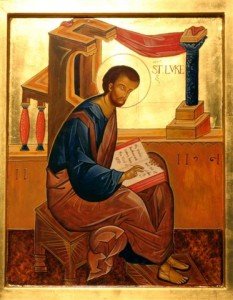 I would continue presenting ideas about those writings ascribed to Luke. Like Luke-Acts as a whole, Luke’s first two chapters emphasize the Spirit. They do so five times (1:15, 25,41, 67; 2:25-27). Luke also emphasizes marginalized people more than any other Gospel. Jesus is born among them in a stable, and angels appear to shepherds, who were among the outcast. Women, that is Elizabeth, Mary and Anna, are prominent in his story of Jesus’ birth.
I would continue presenting ideas about those writings ascribed to Luke. Like Luke-Acts as a whole, Luke’s first two chapters emphasize the Spirit. They do so five times (1:15, 25,41, 67; 2:25-27). Luke also emphasizes marginalized people more than any other Gospel. Jesus is born among them in a stable, and angels appear to shepherds, who were among the outcast. Women, that is Elizabeth, Mary and Anna, are prominent in his story of Jesus’ birth.
So also are Gentiles. The final hymn, the Nunc Dimittis, ends with an affirmation of the true significance of Jesus not only for Jews, but also for Gentiles; he is the salvation that God has prepared in the presence of all peoples, a light for revelation to the Gentiles. Yet the very last line of this prayer reads: and for the glory to Your people Israel. Luke does not overlook or negate Jews, but he does emphasize the expansion of early Christ-communities into the Gentile world and the full inclusion of Gentiles into what began truly as a Jewish movement.
Thus from the vantage point of the early second century, Luke and Acts look back on what had happened since the time of Jesus. The author proclaims in both volumes that the inclusion of Gentiles as well as Jews in the Jesus movement was divinely and also providentially ordained from the beginning of Jesus’ life. It was neither an accident nor a mistake.
Tradition has consistently named Luke, Paul’s beloved physician, as the author of the Third Gospel. Irenaeus is probably the earliest witness. In the beginning of the 3rd century, confirmation comes not only from Africa and Egypt but also Italy. One author points out that Luke was not a prominent figure in the apostolic church. He was neither an apostle nor an eyewitness of Jesus’ earthly life. It is much more difficult, therefore, to explain how Luke’s name later became attached to the Gospel than it is to accept the Church’s long-standing tradition.
The fullest defense that the author of the Third Gospel was a physician has been made by one scholar that claims the language used in the Gospel is that of a physician. Other scholars have shown that one cannot prove from the language that its author was a physician. Not only is the same vocabulary shared by other ancient Greek writers who were certainly not medical men, but it also seems certain that physicians in those days did not have a technical language of their own.
